#i mean we all do know i don't speak welsh but also i do know how to say more words than southern welsh speakers make me feel like i do :')
Text
Listening to people from South Wales talk is like do I not speak Welsh or do I not speak *your* Welsh
#i am Suffering#i mean we all do know i don't speak welsh but also i do know how to say more words than southern welsh speakers make me feel like i do :')#'da fi' 'sai'n gwybod' 'mas' 'e'....what if we just spoke in a way i could understand. what then#on further consideration i won't be watching pobol y cwm i don't think i'd make it through a single episode#i watched rownd a rownd and like yeah i couldn't understand a lot of it but i felt like a god after listening to people from the south#love and peace to all my southern welsh mutuals but what on earth are you saying#perce rambles#(context i am watching solomon a gaenor which i have to watch it side-by-side with the english version#to understand any of the words ;-; but it's a very good movie for all that i can understand)
0 notes
Note
you’re attacking that neopagan kind of birthstone post about druid plants, but could you please elaborate or at least clarify the explicit trope that is being used that has been historically weaponized?
I used to spend about a good third of my time on this godforsaken website attacking that idea, but sure, I'll do it again. This will be a bit of an effortpost, so I'll stick it under the readmore
There is a notion of 'celts' or Gaels as being magicial and somehow deeply in touch with nature and connected to pre-Christian worldviews that the people who decided to make up the "Celtic tree astrology" used. This is also why Buffy used Irish Gaelic as the language of the demons, why Warhammer uses Gaelic as Elvish, why garbled Scottish Gaelic is used by Wiccans as the basis for their new religious construct, why people call themselves Druids to go an say chants in bad Welsh in Stonehenge, or Tursachan Chalanais, or wherever, etc etc. This stuff is everywhere in popular culture today, by far the dominant view of Celtic language speaking peoples. Made up neopagan nonsense is the only thing you find if you go looking for Gaelic folklore, unless you know where to look, and so on and so on. I could multiply examples Endless, and in fact have throughout the lifespan of this blog, and probably will continue to.
To make a long history extremely brief (you can ask me for sources on specifics, or ask me to expand if you're interested), this is directly rooted in a mediaeval legalistic discussion in Catholic justifications for the expansionist policies of the Normans, especially in Ireland, who against the vigourous protestation of the Church in Ireland claimed that the Gaelic Irish were practically Pagan in practice and that conquest against fellow Christians was justified to bring them in like with the Church. That this was nonsense I hope I don't need to state. Similar discourses about the Gaels in Scotland exist at the same time, as is clear from the earliest sources we have postdating the Gaelic kingdom of Alba becoming Scotland discussing the 'coastal Scots' - who speak Ynglis (early Scots) and are civilised - and the 'forest Scots' (who speak 'Scottis' (Middle Gaelic) and have all the hallmarks of barbarity. This discourse of Gaelic savagery remains in place fairly unchanged as the Scottish and then British crowns try various methods for integrating Gaeldom under the developing early state, provoking constant conflict and unrest, support certain clans and chiefs against others and generally massively upset and destabilise life among the Gaels both in Scotland and Ireland. This campaign, which is material in root but has a superstructure of Gaelic savagery and threat justifying it develops through attempts at assimilation, more or less failed colonial schemes in Leòdhas and Ìle, the splitting of the Gaelic Irish from the Gaelic Scots through legal means and the genocide of the Irish Gaels in Ulster, eventually culminates in the total ban on Gaelic culture, ethnic cleansing and permanent military occupation of large swathes of Northern Scotland, and the destruction of the clan system and therefore of Gaelic independence from the Scottish and British state, following the last rising in 1745-6.
What's relevant here is that the attitude of Gaelic barbarity, standing lower on the civilisational ladder than the Anglo Saxons of the Lowlands and of England, was continuously present as a justification for all these things. This package included associations with the natural world, with paganisms, with emotion, and etc. This set of things then become picked up on by the developing antiquarian movement and early national romantics of the 18th century, when the Gaels stop being a serious military threat to the comfortable lives of the Anglo nobility and developing bourgeoise who ran the state following the ethnic cleansing after Culloden and permanent occupation of the Highlands (again, ongoing to this day). They could then, as happened with other colonised peoples, be picked up on and romanticised instead, made into a noble savage, these perceived traits which before had made them undesirable now making them a sad but romantic relic of an inexorably disappearing past. It is no surprise that Sir Walter Scott (a curse upon him and all his kin) could make Gaels the romantic leads of his pseudohistorical epics at the exact same time that Gaels were being driven from their traditional lands in their millions and lost all traditional land rights. These moves are related. This tradition is what's picked up on by Gardner when he decides to use mangled versions of Gaelic Catholic practice (primarily) as collected by the Gaelic folklorist Alasdair MacIlleMhìcheil as the coating for Wicca, the most influential neo-pagan "religion" to claim a 'Celtic' root and the base of a lot of oncoming nonsense like that Celtic Tree Astrology horseshit that started this whole thing, and give it a pagan coat of paint while also adding some half-understood Dharmic concepts (three-fold law anyone?) and a spice of deeply racist Western Esotericism to the mix. That's why shit like that is directly harmful, not just historically but in the present total blotting out of actually existing culture of Celtic language speakers and their extremely precarious communities today.
If you want to read more, I especially recommend Dr. Silke Stroh's work Gaelic Scotland in the Colonial Imaginary, Dr. Aonghas MacCoinnich's book Plantation and Civility in the North-Atlantic World, the edited collection Mio-rún Mór nan Gall on Lowland-Highland divide, the Gaelic writer known in English as Ian Crichton Smith's essay A real people in a real place on these impacts on Gaelic speaking communities in the 20th century, Dr. Donnchadh Sneddons essay on Gaelic racial ideas present in Howard and Lovecrafts writings, and Dr. James Hunter's The Making of the Crofting Community for a focus on the clearings of Gaels after the land thefts of the late 18th and early 19th century.
@grimdr an do chaill mi dad cudromach, an canadh tu?
233 notes
·
View notes
Text

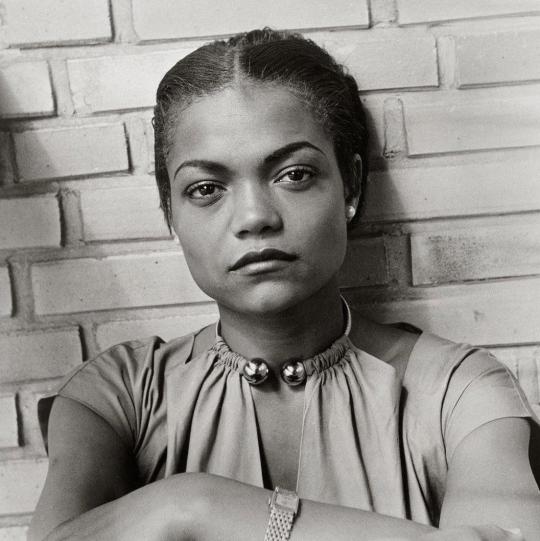
Propaganda
Glynis Johns (Mary Poppins, The Court Jester)—LISTEN, I'd let that woman's voice with all its gravely hoarseness (positive) wash over me all goddamn day, but if that's not enough she managed to play the straight woman to Danny Kaye's jester, all with her cleavage so plunging it might as well have been catapulted into the ocean right after Basil Rathbone
Eartha Kitt (Anna Lucasta, St. Louis Blues)—My friend and I have a saying: NOBODY is Eartha Kitt. A thousand have tried, and they've all come up empty and will continue to do so. Everyone knows her for something: from "Santa Baby" to Yzma in Emperor's New Groove to Catwoman to making Lady Bird Johnson cry for the Vietnam War. She was a master of comedy and sex, an extremely vocal activist, and she aged like fine wine... I honestly don't know what I can say about her that hasn't already been said, so I'll stick to linking all my propaganda. Like what else do you want from me. She was iconic at everything she ever did. Literally name another. How can anyone even think of her and not want to absolutely drown?
This is round 4 of the tournament. All other polls in this bracket can be found here. Please reblog with further support of your beloved hot sexy vintage woman.
[additional propaganda submitted under the cut.]
Glynis Johns:

She walks the line between sexy and cute. Her best role for me is in "The Court Jester as Maid Jean. She's fantastic as the soft but tough captain of the outlaw band and she looks stunning in every gown she wears throughout the film. And of course we can't forget her iconic turn as the suffragette mother, Mrs. Banks, in Mary Poppins! Also shoutout to her distinctive and beautiful voice, kind of smoky and husky. Extremely hot and set her apart from many of her peers."
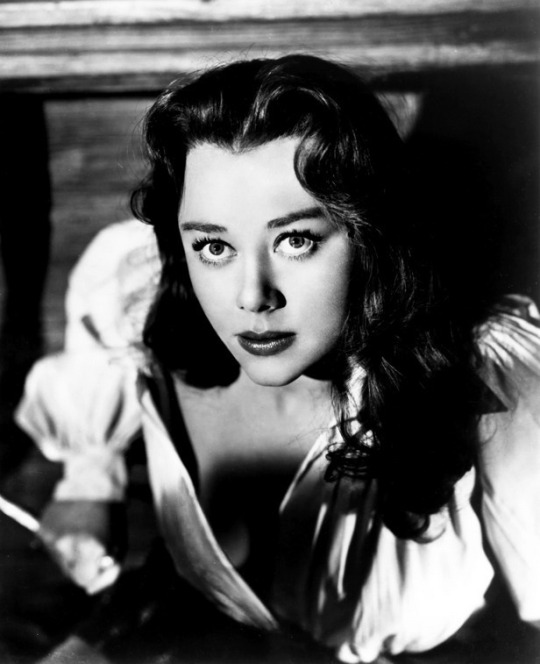
"She was amazing in Mary Poppins (the Suffragette song is severely underrated) and apparently she was Welsh? National pride! And she advocated for arts funding in Wales, which is very cool. Also, she died recently (RIP) making her one of the last survivors of the Golden Age of Hollywood, according to Wikipedia. Also also, she just has a cheeky energy I like? And her eyes are beautiful!"
"She had this wonderful wit and charm to her no matter the role and the most distinctive, striking voice!"

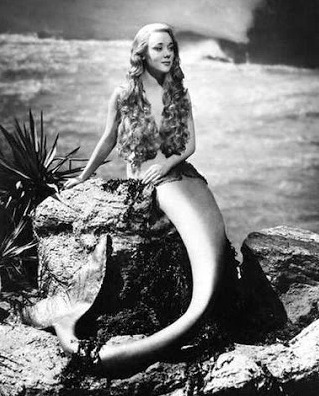
"I mean, incredibly beautiful and talented, can do drama can do comedy. And she was a mermaid."
"Like Bette Davis she has eyes to die for. Unlike Bette Davis you felt comforted by them, even when she was batting her eyelashes at you. Would glady go to Downing Street with her and throw things at the Prime minister"
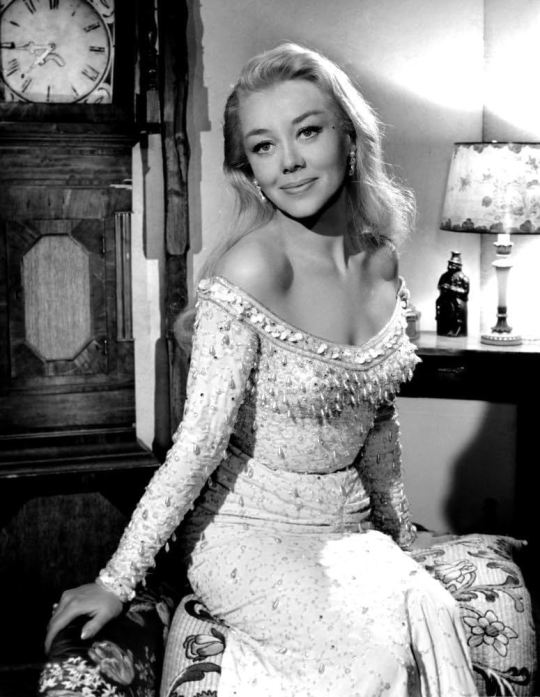
"Listen, listen. I was raised on Mary Poppins and "Votes for women! (step in time)" single-handedly taught me how to be a feminist. Also The Court Jester is one of my favourite movies of all time and she is UNBELIEVABLY gorgeous, charismatic, funny, and clever in it. She knocks several men out. Absolute icon."
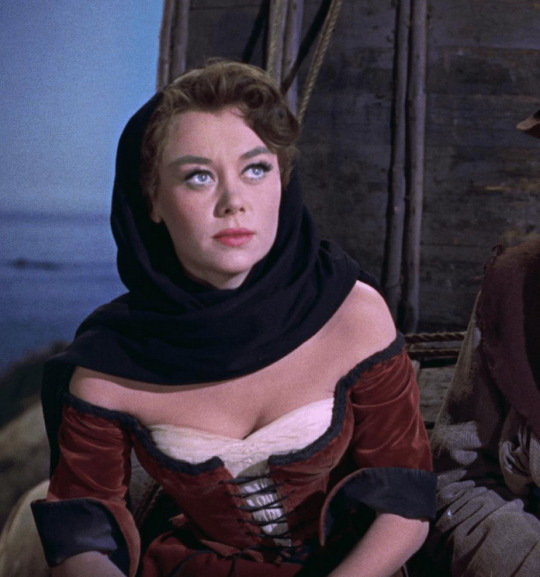
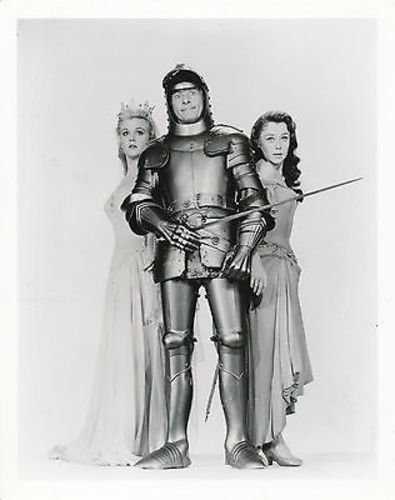
"I love Glynis Johns. Most of the reason is The Court Jester where she's a sensible and capable foil to whatever what going on with Danny Kaye at the time. She was also the first star I based an OC on. An OC that I still have to this day! Anyway here have some YouTube links love u bye"
Mermaid clip:
Court Jester (sharing a bed trope):
youtube
Court Jester (seducing the king):
youtube
"VOTES FOR WOMEN! Well, votes for this woman. Please."
youtube
Eartha Kitt:
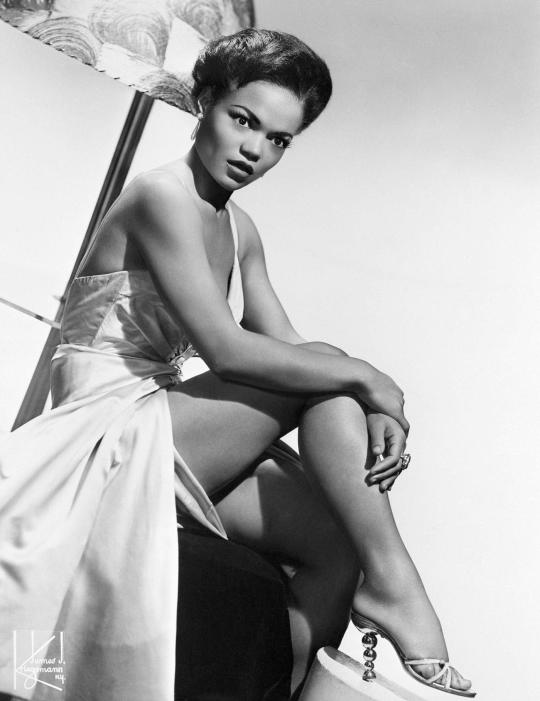
"A hot vintage woman who was not just known for her voice, beauty, poise, and presence, but also her unapologetic ways of speaking about how she was mistreated in the show business as a girl who grew up on cotton fields in South Carolina in the 1930s through the 1940s coming to Broadway first and then Hollywood."
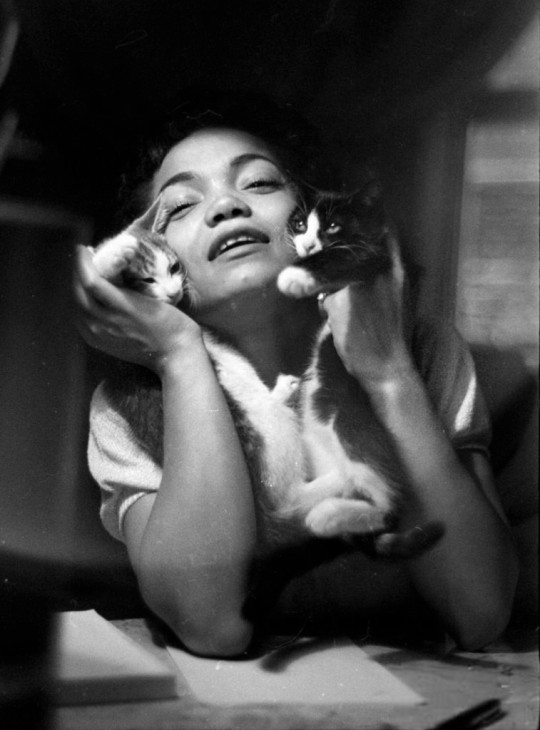
"Have you watched her sing?? Have you seen her face?? Have you heard her talk?? How could you not fall instantly in love. She makes me incoherent with how hot she is."

"She can ACT she can SING she can speak FOUR LANGUAGES she is a GODDESS!!! Although she is (rightfully) remembered for her singing, TV appearances (Catwoman my beloved), and later film roles, her early appearances in film are no less impressive or noteworthy!! She’s an amazing actress with so much charisma in every role. She was also blacklisted from Hollywood for 10 years for criticizing the Johnson administration/Vietnam War, so. Iconic. Also Orson Welles apparently called her “the most exciting woman in the world.”

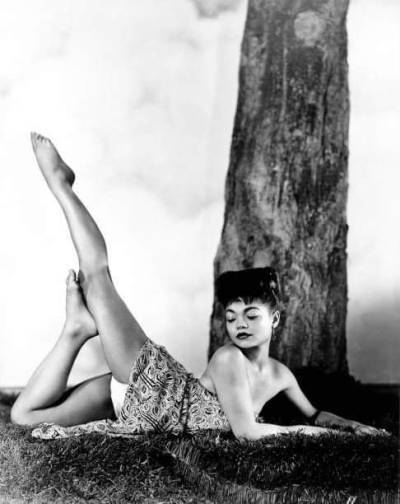
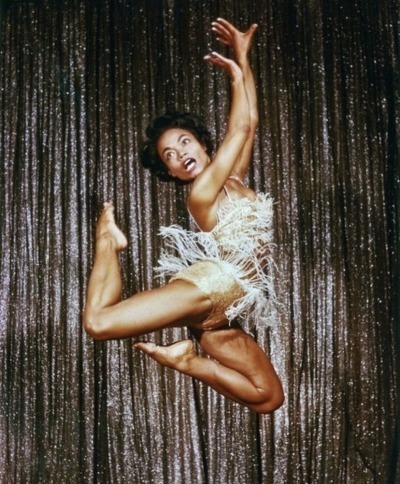

"She had such a stunning, remarkable appearance, like she could tear you to shreds with just a glance- but the most undeniable part of her hotness was her voice, and it makes sense that it's what most people nowadays know her for. Nothing encapsulates the sheer magnetism of her singing better than this clip of her and Nat King Cole in St. Louis Blues, she pops in at 2:49. Also I know it's post-1970 but her song that was cut from Emperor's New Groove is likely to make you feel Feelings."
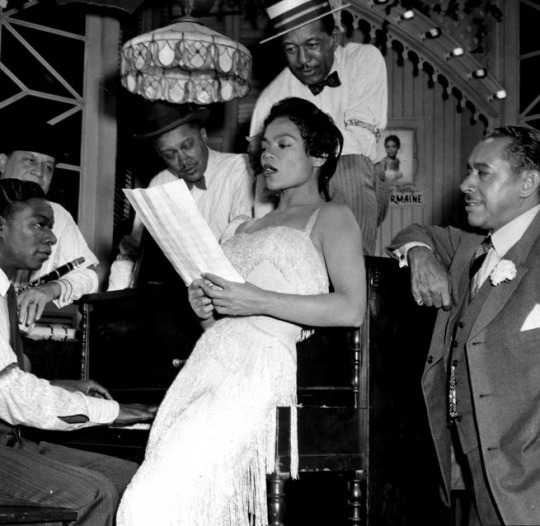
Even with as racist as Hollywood was in the 1950s and 60s, Eartha Kitt STILL managed to have a thriving career. She also once had a threesome with Paul Newman and James Dean, and called out LBJ over the Vietnam War so hard that it made First Lady Johnson cry. Eartha Kitt was talented, sexy, and a total badass activist.
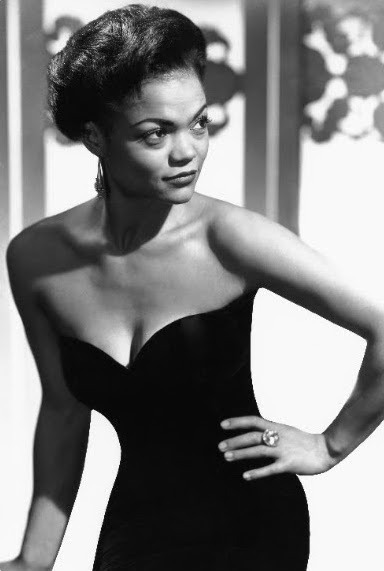
252 notes
·
View notes
Text
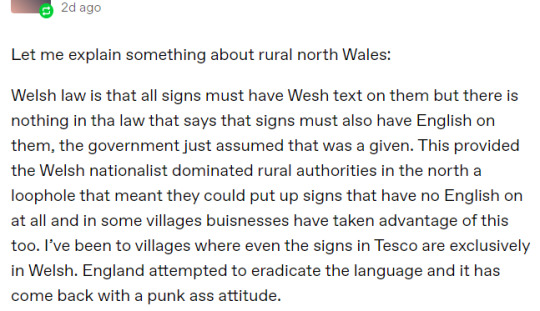
Bad Takes in the Welsh tag vol. II- this reblog on a post about the number of Welsh speakers. (I have cropped out the username of OP and as ever, I only focus on the sentiment, not the person. If you know OP's url kindly do not send them anon hate etc.).
So I saw this take a few days ago in a reblog on a post in the Welsh tag and wanted to address this sentiment as well, since it does the opposite of that other bad take that I saw and made a post about the other day. To be clear, I don't disagree entirely with OP, but there's an element of wishful thinking that I sometimes see when it comes to Welsh / other minoritised languages which can end up doing more harm than good.
This screenshot was also discussed in the LGBTQIA+ Welsh Discord I run and the broad consensus from those of us in there who live in Wales is that OP is painting a very inaccurate picture of the status of Welsh, particularly of Welsh in North Wales. It is frustrating when you have people who value Welsh, but don't value Welsh enough to bother with accuracy in their promotion of the language. This post is intended as a gentle reminder that we can fight for the Welsh language without misrepresenting the situation on the ground so to speak.
The post itself has a 'fuck yeah, Welsh!' attitude which I personally love. But sadly this particular post is riddled with misinformation. First of all, we have "Welsh law is that all signs must have We[l]sh text on them but there is nothing in the law that says signs must also have English on them". Now the wording is kinda vague here- but I'm going out on a limb and saying that the OP is likely referencing The Welsh Language Standards Guidelines (which have been updated several times over the years). The guidance has a number of Standards relating to signs in the Welsh language, such as Standard 32, Standards 47-52, Standard 66 and Standards 111-113. The section of Interpreting the Standards also contains relevant text, such as in Part 3- Interpreting the Standards article 15:

Plain text: "For the purposes of the standards a requirement to publish, provide or display any written material in Welsh does not mean that material should be published, provided or, displayed in Welsh only, nor does it mean that the material should be produced in Welsh first (unless that is specifically stated in the standard)"
Of the Standards listed above, Standards 47-52 are specifically designated as Standards relating to signs and notices displayed or published by a body. Which state things like "... if the same text is displayed in Welsh and in English, you must not treat the Welsh language text less favourably than the English language text" - Standard 47 and "You must ensure that the Welsh language text on signs and notices is accurate in terms of meaning and expression" - Standard 49.
Anyway, back to the point. OP is incorrect in stating that there is a loophole by which the Welsh Law forgot to specify that the signs had to have English as well as Welsh and that public bodies can get away with monolingual Welsh signs. This just isn't true. Important to note is that the law is intended for public bodies- so big companies, road signage makers etc. This guidance isn't for random farms in North Wales which have signs that say "wyau <-" pointing up the lane with no English translation.
Now, the next sentence is a little loaded, well-meant, but a little loaded nonetheless. "The Welsh nationalist dominated rural authorities in the North"- it's loadedness comes down to its vagueness I think. While it isn't wrong per se that Welsh Nationalist parties like Plaid Cymru do well in the North West, it is a little skewed to ascribe Welsh speaking status to whichever party is doing the best in a given area. It isn't that clear cut, unfortunately. To get into this issue, we have to talk maps.
So those Welsh speaker maps that have nice gradients and have the West of Wales coloured in dark, gradually getting lighter as you move East? Unfortunately, these maps can be very misleading (especially if, like in the map OP was commenting on, the source of the data was left off). But the long and short of it is- these maps tend to imply that Welsh is exclusively spoken in the NW and that everywhere East of Bangor has had it. But the data presentation is very flawed, since it tends to erase Welsh language gains in places like Cardiff, Swansea and Monmouthshire.
You've all seen maps like this right? NW in the darkest colours and SE in the lightest?
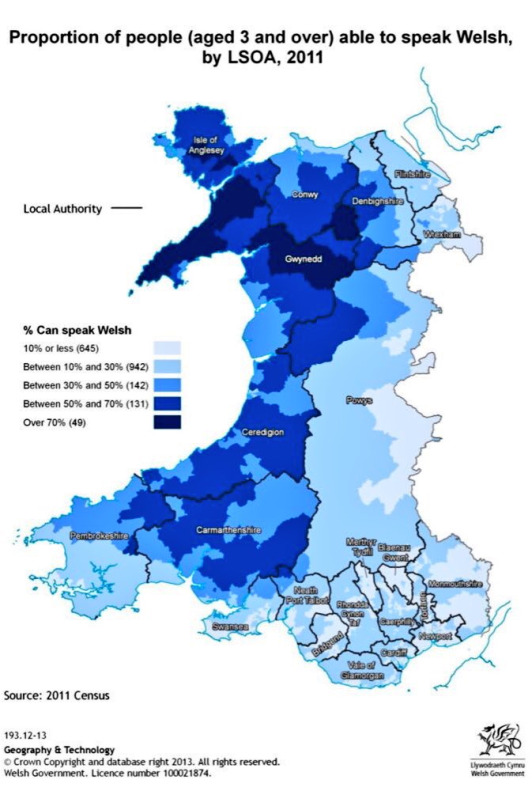
Unfortunately when it comes to these kinds of maps, they can be very misleading from a language revitalisation point of view.
Here's some maps I actually studied at undergrad for this purpose

On the face of it, your eyes zip up to Gwynedd and Môn on the first map and then over to the second and- 'oh no!' you might say, there's been a -2.1 to -4.0 percent decline in Welsh speakers in those areas. And of course, this is something that language revitalisation wants to address. But look at the first map again. Look at, Monmouthshire, Caerphilly, Cardiff and Swansea. Then look at the second map.
Welsh speaking is actually being increased in these areas, between 2001 to 2011.
The misleading nature of a language map like this one is not its borders, its colour or key, but its omission of the sociopolitcal forces at play in language revitalisation. Large population centres like Cardiff, Caerphilly, Newport and Swansea are actively gaining more Welsh speakers. While Gwynedd and Môn are losing some. But Welsh speaking (despite a few wobbles) is on the increase. So where did those Welsh speakers from the North go?
South.
It isn't a hard-and-fast rule, but many rural Welsh speakers (especially those who live in areas with high amounts of holiday homes which drive up rent/cost of staying in villages in North Wales) actually end up moving to more urban areas in the South, meaning that some of the decline of Welsh speaking in North Wales is down to Welsh speakers just, moving to a different part of Wales- which in turn makes those areas see an increase in Welsh being spoken.
Of course, we actually have to address the cause of the exodus of Welsh speakers from rural areas holiday homes raising house prices making them unaffordable for locals and drives them away but the way that our data is represented is not as dire as it looks. Still not great, mind, but not apocalyptic either.
Then there's the other inaccuracies in this post. Small businesses like farm shops, high street businesses and houses can have Welsh-only signage because they are not local authorities and much of the guidance indirectly referenced by OP mostly only applies to local authorities. This is how you have farm shops advertising produce in Welsh only, or shop names in Welsh (such as Siop y Pethe and Broc-Môr in Aberystwyth) or the name of the house my flat is in. Businesses have different regulations for signage inside the shop in different situations. But the guidance indirectly referred to by OP in the screenshot mostly applies to road signage.
Big name brands such as Tesco are definitely not going to have monolingual Welsh stores and it is disinformation to suggest that they do- especially not when they've made gaffes such as "sboncen" to mean squash (the drink). "Sboncen" means squash (the sport), while they should have put "sgwash", meaning the drink.
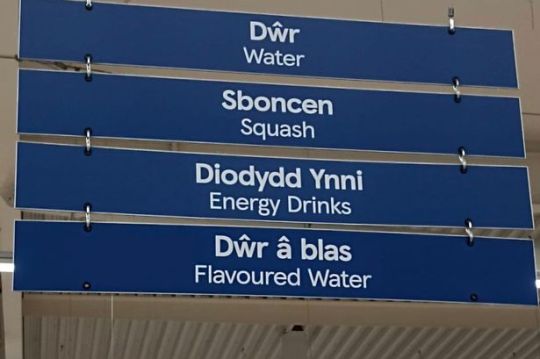
Or my favourite instance of these "arwyddion gwael", in which instead of offering a free ATM service, this ATM on the Tesco Express in Aberystwyth offered "codiad am ddim" (free erections):

So I dread to think what a fully monolingual poorly translated Welsh Tesco would look like.
I don't disagree with OP on the final part, that we should celebrate Welsh's "punk ass attitude" in surviving despite attempts to eradicate it from existence. But spreading false information is definitely not the way we should be doing that.
Instead, we can celebrate things like the National Eisteddfod coming to places like Wrecsam in 2025, which aren't typically selected due to there being fewer speakers. But what bringing the National Eisteddfod to areas with low-speakers does is reestablish that yes, actually, Welsh deserves to be spoken all over Wales, not just in Y Fro Gymraeg (Welsh concept equivalent of the Gaeltacht in Ireland). It's an active, real reclamation of areas previously lost for Welsh and revitalising them by bringing the language back with the biggest Welsh language event anywhere.
221 notes
·
View notes
Note
cannot believe i spent so long trying to work out when to pronounce 'wy' as 'oi' and when to pronounce it as 'wi-' and it turned out to be dialect
LOL yeah, that caught me out as a kid. In fairness there are times when we'd pronounce them the other way? I don't know the precise rules anymore, but I think if it's a word that starts with "Gwy-" you would usually pronounce it 'wi-' (think of words like 'gwynt' or 'gwydr', for example), while if the word naturally starts with 'wy-' you would usually pronounce it 'oi-' (like 'wyth' and 'wythnos'). BUT there are exceptions to those as well. Mostly it's dialect if you aren't sure!
That said I'm also gaily saying "Yes, in the south we pronounce it 'oi-'" but in fact the phonemes "wy", "oe" and "oi" are all pronounced subtly differently in the south! We are complex and contain multitudes (although it is 100% Fine if you just use the same pronunciation for each, all it means is people can hear you're second language which is considered Good, Actually)
Also! Do you want to know the fossilised Third Dialect Option?
It's now pretty much extinct, but the dialect once spoken in the south east was Gwenhwyseg. The south east, being the place Cardiff is and also closest to the London commuter belt, saw the biggest language losses, so while these days the dedicated work of activists since the 90s has seen a thriving Welsh speaking community now establish in Cardiff and also multiple Welsh language schools in the area, the native dialect has pretty much died out with the oldest generations. What's now spoken is a mix of Cymraeg Byw (the learner dialect) and the various dialects from across Wales as young people move to Cardiff.
But Gwenhwyseg, much like all other dialects of Welsh, had a lot of its own vocab, and certainly its own pronunciation quirks influenced by accent. And there are two big examples of this latter point which have clung on and survived through, of all things, place names in Newport and Cardiff that are still pronounced the Gwenhwyseg way, but other Welsh speakers all wince at and think are non-Welsh speakers fucking it up.
Example one: "ae". Ordinarily pronounced either 'ey' or 'eye'. In the word 'caer', a common part of Welsh placenames, it's pronounced 'kire'.
In Newport, the area near the old hillfort called the Gaer is pronounced "Gare". In Newport, Caerau Road - normally pronounced "kire-eye" - is pronounced "Carer" Road. This is correct for Gwenhwyseg pronunciation.
Example two: "wy". Ordinarily either 'wi' or 'oi', as established; but both north and south are agreed that it's one syllable, right?
In Cardiff, there is a road called Crwys Road. It's pronounced "Croo-iss" Road. This is correct for Gwenhwyseg pronunciation, which would say 'wy' as two syllables.
As I say, though, that's pretty much lost now, soon to be extinct. But still! Fun With Accents.
375 notes
·
View notes
Text
TINY WEE PSA
Hi! Are you trying to write some British people? Here are some random thoughts about exaggerated Britishness (With heavy chat about Scotland because I know Scotland the best):
"I'm going to the store!" Store is not a popular word for a place to buy things. People from the UK will generally say "shop". If they're just going to get milk or something, they may go to the "corner shop" - which people from NY especially will know as a "bodega"
"Hand me an eraser." While some people do say eraser, "rubber" is more common. This is amusing to me because to people from the US especially, it's very different in meaning.
If your character is visiting someone, it's very common to be offered tea. "Fancy a cup of tea?" or more casually "Fancy a cuppa?"
Pub ≠ bar. Pubs include bars, but are also places to get a meal. People do go there to drink ("Get a pint") though, and some pubs don't serve children or allow them in. Many do, however.
There are 100s of accents across the nation, more than just typical posh English, Welsh and Scottish. Please pay attention to your character's background and dialect. The city of London alone has 4 major accents. (For Good Omens fans, Crowley and Aziraphale are both sensationally posh. Aziraphale speaks "The Queen's/King's English" which is notably more formal and collected - Crowley does not.)
Some good swears include "Bellend", "Pillock", "Knob" and "Twat". In Scotland we also have the tamer "Daft(ie)" and "Tube"! Any object can become an insult: "You FUCKING MICROWAVE"
Some good pet names include "Love", "Pet" and "Poppet"
Along with tea we have a carbonated drink called Irn Bru. This is ESPECIALLY popular to Scots but you can find it in England. It is bright orange and fruity in taste.
We buy milk in pints
The chocolate bar Freddo is typically how we measure inflation these days. (I wish I could say this was a joke but tabloids love the chocolate test)
It does rain a lot. Like a shit ton. There are sunny days but nonetheless. The way to start conversation is ALWAYS weather. "Lovely weather innit?" always works, especially in terrible weather.
Sarcasm and dry humour are very popular.
IT IS A PETROL STATION, NOT A GAS STATION
A lot of people smoke or vape. This is very evident especially in cities like London and Edinburgh.
People from southern England especially are typically very removed and tend not to pay attention to anyone else. It's a massive "Not my problem". They can be very friendly by all means, but typically keep to themselves and don't talk to many people.
Biscuits rule the world, especially custard creams. (Jk, they're very loved though)
The school systems are different from that in the rest of the world. Even to one another. The Scottish, Welsh and English education systems are different - but are all composed of Primary school and Secondary school.
Typically people are either passionately wild for the Royal Family or REALLY dislike them.
Terraced and semi detached housing is very common. In Scotland we have "closies" which are blocks of flats that home lots of people, and are typically very square and deshevelled.
McDonald's did not arrive here until the 70s. People were confused by it to begin with.
Fish and chips is a stereotypical yet popular dish. Many people refer to going to a fish and chips shop as "Going to the chippy". Often they do not have seating, and are takeout exclusive.
Britain is a geographical reality, composed of Scotland, Wales and England. The United Kingdom is political and composed of Scotland, Northern Ireland, Wales and England.
Irish people may not enjoy being referred to as "British". Furthermore do not call a Welsh, Scottish or Irish person "English". This is a bad idea and will make people mad.
Day in the life of a true Brexit geezer is a documentary. (Jk)
Basically everyone "hates" the English. Whether this is playful or genuine varies from person to person. Even the English hate the English.
Older women especially have very strong feelings about Princess Di (She was so beloved)
For Good Omens fans: Soho is a small tiny little area in the BOROGH of "The City of Westminster". This is a borogh at the heart of London. You can walk Soho in a day.
Most cities don't have boroughs, but do have wee areas which are basically suburbs or collections of areas.
In schools, it's very common to refer to your teachers as "Sir" and "Miss". This also applies outside of school for young people, but generally is seen more in schools.
"Mate" is the most common way to address a male presenting person passive aggressively, along with "Love" for female presenting people. "Mate" is more common and works both ways.
"Pissed" means drunk. "Oh, he's pissed" = "Oh, he's drunk". Increasingly you'll find people say "pissed" to mean angry, especially young people. However "peeved" is what was originally used to mean angry.
#This is mostly about Good Omens fanfictions like please write the English as English#writing#british people#uk#writing advice#mildly humorous#idk ANYMORE#help#character writing#bad writing advice
55 notes
·
View notes
Text
This is long. I've been percolating on it a while.
As usual, when I see a discussion going on that has no nuance, where two sides have been staked out and any suggestion that one side has a point is taken as full support for the other side and everything they do... I feel compelled to try to point out the nuances. This is likely to get me a lot of nastygrams in response, possibly from both sides, but I can't take the lack of nuance any longer.
First, let's begin with this. The government of Israel is committing atrocities. Full stop. There is no way to minimize this. Nothing the civilian population of Palestine has done or could ever do would justify the Israeli government's response here. Israel, as a state, are unmitigated bad guys in this situation. Just like my country, the USA, were unmitigated bad guys for invading Iraq on flimsy pretenses and committing atrocities in the process. A nation doing terrible things doesn't mean the people of that nation are terrible. I pointed this out when the government of Russia chose to invade Ukraine. In democracies, like the US and Israel, the people bear more responsibility than in dictatorships, but as a person who protested the Iraq War and tried to vote out the president responsible for it, I am deeply, deeply uncomfortable with the idea that all the citizens of a democracy are responsible for the actions of its government.
And I am flat out appalled by the notion that non-citizens with no vote should be held responsible; treating Jews as synonymous with the current Israeli government and its awful decisions is like the US rounding up Japanese-Americans and putting them in camps because the Japanese government attacked the US. It was wrong then, it's wrong now, and if you come from an English-speaking country and you're white, 90% chance you come from a country that committed similar atrocities in the course of expanding an empire or colonizing land that didn't belong to it. (I think the Irish, Scottish and Welsh are exceptions; I do not know of any others.)
If you blame Jews worldwide for the actions of Israel, you are a shithead, and if you come from the US, England, Canada, Australia or New Zealand, you are also a hypocritical shithead. France and Germany and Spain, yes, still a hypocritical shithead. Was your nation ever a colonial power? Then if you blame Jews worldwide for Israel's actions, you are a hypocritical shithead.
More to say, possibly more inflammatory, under the cut.
I have seen people I follow saying things like "We should treat Zionists in leftist spaces the way we treat TERFs, they should have no place with us." A lot of "denounce Zionism." A lot of "Zionism is evil."
I have also seen, on the flip side, the disgusting behavior of governments and institutions punishing people for making the argument that Israel should not be murdering Palestinian civilians. This is awful, and inhumane. The people of Palestine have done nothing to deserve this; the existence of terrorists committing atrocities in their name does not justify a civilian population being murdered. As an American, I feel very strongly that I would like to not be murdered for what the CIA did in South America, okay? And frankly, all Americans and anyone from any kind of colonial power should feel the same way, so this behavior where our governments and institutions give Israel free reign to murder civilians is despicable.
But Zionism does not mean "supporting every horrible thing Israel ever did." It means the belief that Jews need and deserve a homeland of their own, that the best place for that homeland is Israel, and as a result Israel has the right to self defense. (Self defense, y'all, is not a euphemism for "murder civilians." In fact murdering civilians usually is antithetical to self defense, because it radicalizes the civilian population against you. You don't fight terrorists with bombs unless your goal is to make more terrorists. Which I actually think Netanyahu's goal is, because he is a right wing war hawk who wants an excuse to commit atrocities against Palestine. That's not good for Israel, but it's good for a right wing war hawk who wants to stay in power.)
I've seen a lot of arguments that Israel are colonizers. Technically it's true but that word has certain baggage due to the motives and behavior of 90% of the world's colonizers. Specifically, when white imperialists marched in to territories occupied by other people, took them over, and killed, enslaved, drove off or ruled over the people who were already there:
The motive was greed, folks. Want, take, have. We're allowed to have everything because we're white. Nothing about "we need this or people will keep killing us."
It wasn't territory they had ever held. Territory associated with them in the lore of the world's biggest religions? Nope. It wasn't territory they'd ever had at all.
They did the colonizing themselves. A third party didn't colonize and then hand it over to them.
Israel's situation is different for multiple reasons.
For 2000 years, Jews have not been treated as full and equal citizens of anywhere they tried to live; those 2000 years have contained so many instances of Jews being murdered en masse, or driven out and all their stuff stolen, I don't think we have an accurate count of how many times it happened.
Anywhere that Jews were treated as full and equal citizens for any period of time, a change in government or in the circumstances of their neighbors could reverse this. Most Jewish citizens of Germany thought of themselves as Germans first, and thrived in Germany, until Hitler stirred up the currents of anti-semitism that apparantly always are present under the surface of a European or European-based society.
It is very easy to argue that the reason for this is that Jews were driven out of their own homeland, and their efforts to keep their own culture during the diaspora made them mistrusted strangers everywhere. Therefore, it's also very easy to argue that the solution is for them to have a homeland again.
This was why Zionists in the 40's were successfully able to get Britain to cede them Palestine. There are very good arguments from the evidence of history that Jews do in fact need a homeland of their own, because anywhere else they live may spontaneously decide to murder them for no reason, because it has been happening for 2000 years and has no evidence of stopping.
Of course, there's a huge problem. Britain didn't hand over part of Britain. Nobody handed over Rome, which forced the Jews out of their homeland originally, or Germany, which had just committed the Holocaust. (These would not have gone well either.) They handed over a territory full of people who had done nothing to the Jews, had nothing to do with the Holocaust, and were not consulted or asked for permission.
Jews sought an ethno-state where Jewish people would be treated as more equal than non-Jews because they're an extreme minority worldwide, and anywhere where they allowed non-Jewish people to become full citizens anytime they wanted, would eventually fill up with enough gentiles that it would again become dangerous to be Jews there. Palestinians were, rightfully, pissed off that they were being forced off their land. So they fought back, and Israel retaliated, and that is how this whole poisonous dynamic began.
Does Israel have a right to the land they were ceded? That is unfortunately the wrong question. After Europe and other places randomly murdered Jews for being Jewish for 2000 years, it becomes really hard to argue against the necessity of a Jewish homeland, somewhere, if you have any empathy for Jewish people at all. Where should that be? Well, there is no uninhabited land on Earth that's suitable for habitation; anywhere would have required throwing people off their land.
This may be colonizing, but it's different colonizing than what white people did. It was done for survival, in the face of 2000 years of threats, and it was done by giving them back land they'd lost 2000 years ago.
There are very few cultures that still exist after being thrown off their land that long ago. Romani still exist, but we really aren't sure exactly where they came from... last I heard the best theory was somewhere in India. Native Americans and other indigenous people displaced by colonization were forced off between 100-500 years ago and a lot of their culture has been lost. This makes it kind of difficult to compare the Jewish situation to anything else. But if there was a movement to give the Native Americans back Montana, and fuck all the white people currently living in Montana, they can move or they can live in the new Native American nation... honestly I do not think the left would object to this. (The right would, they'd screech about it, but a lot of leftists would either be "good for them! fuck those white Montanans!" or "well, I dont think it's right to force people out of their homes, but Native Americans were forced off that land in the first place, so...") The Native Americans lost that territory like 150 years ago or so, not 2000. It's not the same thing. But it is, unfortunately, the closest analogy we have, because no one else managed to hang onto their culture and their memory of having a homeland and the world's memory of it too, for 2000 years.
So. Can you criticize Israel? How can you not? You have to criticize Israel to be a good person because they are murdering civilians. They received a horrible provocation from professional provocateurs who knew that they would react harshly, and that that reaction would fuel their movement, and they did exactly what Hamas knew they would, which is incredibly stupid from the perspective of protecting Israel (but Netanyahu wants to protect his own power, not Israeli citizens) and also morally bankrupt on every level. Arguing that Hamas didn't actually do anything all that terrible is simultaneously untrue and besides the point, because Palestinian civilians aren't Hamas and you can't fight a terrorist group with bombs.
But can you argue, with a straight face, that a homeland for Jewish people shouldn't exist? When Israel's behavior has just caused worldwide antisemitism to spike, and once again, random Jews are being subjected to violence for nothing they did? When we have 2000 years of history of the world attacking Jewish people for no good reason? (I do have some theories as to the reasons, but none of them were good ones.) How do you think Jewish people should protect themselves from antisemitic violence, then? What other options are on the table?
And if you're blaming random Jewish people on the Internet who are not Israeli for the actions of Israel, you are doing the same thing the state of Israel is doing when they blame all Palestinians for the actions of Hamas. Justifying their behavior. Plus, if you come from a colonial power, and if you're on the Internet odds are you do, you're being a sickening hypocrite, because I bet you don't want to be murdered for the atrocities your country has committed. I sure don't! I don't want people blaming me for the Iraq War! I was against it. I don't want people blaming me for Trump! I voted against him. I'm American and my country has done horrible, horrible things that I don't want people to treat me badly for because I also think they're horrible and never supported them... but that doesn't mean I'd be okay with America ceasing to exist.
Jews who support Israel's existence, whether they are Israeli or not, are still not personally responsible for Binyamin Netanyahu being a monster. Israelis aren't entirely responsible for the fucker, given that it is human nature to vote conservative when you live in fear, which is why conservatives fearmonger so hard. Their press probably makes it fairly hard to learn about the atrocities they are committing, just like the American press makes it hard to know what evil things America has done lately. But especially, Jews who aren't Israeli citizens can still support Israel's existence while believing that Israel's current behavior is an atrocity, because Israel was founded to protect Jews from worldwide antisemitism, which if you are blaming Jews for Israel's behavior, you're participating in.
I'm not Jewish. But I find the behavior of gentiles who are demanding that Jews not only reject what Israel is doing (that's fair, it's monstrous) but reject Israel having a right to exist, in a world where America, which took over a continent because we felt like it and slaughtered most of the people who lived here, is never told it doesn't have a right to exist... I mean if you're so out there that yes, you believe America and Canada and Australia have no right to exist, I suppose you're being consistent, but if that is not your position, you don't get to argue against Israel existing. Israel displaced people who didn't deserve it and has treated them like shit ever since, just like every other colonizing power, but Israel, at least, is doing it because Jewish people keep getting murdered for no reason and this has been happening for two millennia. The US has no such justification for existence.
This entire situation is more complicated and nuanced than you think. Not the part where Israel's committing atrocities, that's beyond question. That's horrifying and the world really needs to force them to stop. But everything else -- Zionism, the existence of Israel and its right to self defense, blaming Jews for Israel, yadda yadda -- all that. That is more complicated than you think it is.
23 notes
·
View notes
Note
Hi, I don’t know if you’re comfortable answering this but I was wondering what your perspective is as a British person about all the non British people making so many crazy (even delusional) accusations about the UK, monarchy, and the royal family when they clearly have no idea what they’re talking about. I see the ridiculous things they say and the assumptions they make (particularly on TikTok) and even as an American it makes me mad because it’s so obvious they’re speaking without bothering to do any research. I’m curious how British people in general are feeling about this because social media is not always a great representation of the entire population. I know British people have their own opinions about the monarchy but it’s different when people from other countries are speaking about it and spreading outright lies about the UK.
I can never answer anything normally so I have multiple strands to this answer:
I hate people talking about something like they know what they are talking about but they are blatantly wrong - I had to do an assembly at school on Guy Fawkes the week after we did our Bonfire Night podcast episode and the effort I put in to not correcting my partner teacher was indescribable
I think it is almost impossible to fully understand another culture, even if you've lived there a really long time, especially if you don't live there - living in the UK, I've been bombarded with US images, politics, TV, literature, sport, etc but I don't understand what it's like to be American. I would never explain to someone how the American legal system works or the American political system. I feel the same about Wales and Ireland as individual countries (rather than as part of the UK) and my parents are quite literally Welsh and Irish
The more completely out there stuff I can laugh off but the almost believable but not quite stuff gets to me more. Also, explicitly cruel things I struggle with - I'm thinking the person I saw on TikTok the other day who said that Kate is actually dead or the person on Tumblr who said that Meghan was abusing her children. I can't even think about it and I have to just block and log off
Part of the reason I love doing the podcast so much is because it is time to provide facts. We joke about doing research but we really do a lot of research and if we don't know something, we say that or just don't talk about it at all
As for the other part of your message, "I’m curious how British people in general are feeling about this because social media is not always a great representation of the entire population. I know British people have their own opinions about the monarchy but it’s different when people from other countries are speaking about it and spreading outright lies about the UK":
I've said this before but I cannot get across how much most people in Britain do not care about the royal family however people in Britain also don't like to be told something about them is weird or wrong - I'm thinking about things like how British people reacted when people said beans on toast was weird
Social media algorithms means lots of people in the UK haven't seen what people are saying about the BRF online (I am cultivating a lovely online experience where I very rarely come across the BRF by accident and I talk about them a lot!) and not everyone in the UK has social media either
I think the best thing to do is not engage with anything online that upsets you. That's not to say you should end up in a social media bubble - you should definitely expose yourself to thoughts, opinions and cultures you wouldn't normally come across - but if you are finding yourself getting upset or angry or frustrated with the same kind of content, just block, mute and move on.
15 notes
·
View notes
Text
Where would the twisted wonderland locations be in real world?
Has this post been done before..? I don't know.
Now, let's get the easier things out of the way.
Scalding sands are obviously somewhere in Arabic country. In the Wikipedia for Aladdin, it states that it is a middle Eastern tale.. The clothes seem similar to that of an Arabic country. Turquoise colour is however, often used in over here turkey, but... Turkey is not an Arabic country.. It is stated that Jasmine's clothes were inspired by South Asian clothing... In the wiki it states that Agrabah was also inspired by ottoman empire, the silk city's camel bazaar seems similar to that of an bazaar over here. Hm.. I think that it might be based off of Afghanistan, it isn't fun fitting at all, and I'm just throwing it off there, but it is definitely somewhere similar to there and ottoman empire.
City of flowers is, without a doubt, based off of France. Noble bell college is based off of the Notre-Dame de Paris, more specifically, île de la Cité, an island in the Seine River(this part was taken straight out of the Wikipedia article for Notre-dame de Paris). There isn't much more to say about it, as it was rather easy to find out about it.
Queendom of roses is probably based off of United Kingdom, as the original novel it is based off of was written in england(believe me I will have to do this. A lot.), in November of 1865. From what I was able to see in the manga, the architecture seems to be more modern, along with the clothes as well. That would make anyone from there... British, take that how you will.
Now.. Onto the trickier parts.
Sunset savana, it obviously takes place in.. A savanas. Savanas seem to be most common in northern Australia and probably in Africa, looking at the cards in the Japanese server, the clothes for the sunset savana seems to be resembling that of traditional African clothes, but I might be wrong on this I'm sorry, but I strongly believe that is the case! I am not too sure on the exact country though, probably somewhere similar to Nigeria as the clothes seem to be similar.
Coral Sea, I.. Genuinely don't know. I can't even track anything down aside from going with where the original tale of the little mermaid was written, which is probably Denmark? So... Danish fish mafia???? I don't know??? Azul's name means blue in Spanish and Portuguese, and Floyd means grey and grey-haired in Welsh???? I don't know, I'm confused now.
Shaftlands, it is.. Probably based off of either Germany or somewhere that speaks English, since Cater's last name is english and jack is either english or French, however, if I go off of where Snow White is written from, it's Germany, and the most memorable character from there is vil, who's last name is "schöenheit" which means beauty in German, so... It's probably based from Germany.
•harvest town is... Also in shaftlands, it's probably based off of a town in Germany, I don't know. Epel's last name, felmier, means farmer in Romanian and such, his first name epel sounds similar to the German word for apple, apfel.
Island of woe, another tone.. Where I just don't know. It is definitely based off of Greece for sure, as Idia's name means reserved, private and such, meanwhile his last name comes from the Latin word shroud, which is the name for a cloth that is used to cover over the face of the dead. Ortho means unharmed, safe and such, and plus, the name of the S.T.Y.X is probably based off of the Styx river in the Greek mythology that connects the earth to the underworld.
Briar valley, now.. Another one that is hard to settle for, however, if we go off with how daisomnia looks, it's probably somewhere in Gothic Victorian time, since daisomnia looks like a Gothic Victorian castle, going off of cars and such aren't used in Briar valley, it makes me fully believe that it is mostly based off of the Victorian era. The names... Malleus is the name of a well knows witchcraft, and his last name is, according to the fandom wiki, is deprived off of the words dragon or devil in Romanian and such. Gothic Victorian architecture seems to be most popular in Europe, we don't know much about the Briar valley sadly, but sleeping beauty the fairytale was originally written in.. French.
The final matches, this is all speculations on my part and this was for fun!
City of flowers-france
Queendom of roses-united kingdom
Sunset savana-africa, Nigeria
Coral sea-i... I don't know...
Scalding sands-an Arabic country/probably somewhere in South Asia, possibly Afghanistan
Shaftlands-germany
Island of woe-greece
Briar valley-france/possibly Romania, somewhere in Europe.
#admin's rambling#dragon's rambling#twisted wonderland#pomefiore#daisomnia#heartslabyul#ignihyde#savanaclaw#scarabia#octavinelle#floyd leech#jade leech#lilia vanrouge#malleus draconia#vil schoenheit#epel felmier#leona kingscholar#ruggie bucchi#jack howl#riddle rosehearts#cater diamond#kalim al asim#jamil viper#sebek zigvolt#silver#azul ashengrotto#deuce spade#ace trappola#rook hunt#idia shroud
94 notes
·
View notes
Text
Okay well I watched the first episode of Blood Origin and honestly my thoughts are:
I just don't understand why people are so resistant to changes/new plotlines/some lore breaking of *recent* franchises but gobble it up when it's older. People telling an untold portion of a common tale is well established in storytelling culture. The first example that springs to mind is Lancelot, who straight up does not exist in original Authorian legend and was a FRENCH invention when the myth spread. Nowadays, most casual enjoyers of King Author stuff don't bat an eye to Lancelot's presence. Lancelot, who comes to mind, because Sapkowski writes said Lancelot to be in love with Ciri, and we're totally cool with *that* but not with changes to Sapkowski's work.
It's really telling that there's such a bigoted negative reaction to this because honestly? The black people so far have been BLACK black, darker than me, darker than even my black family sometimes. I'm enjoying seeing melanin in fantasy don't mind me. And the hair on the sisters is excellent, I'm liking the costuming, and I *really* like Eile.
The accents are kind of all over the place. Both as individual characters but also as the actors themselves. Sometimes Fjall goes from generic American accent to some form of fake Irish to ????european???? and back and it's distracting and weird. HOWEVER I do like the Irish and Welsh accents in high born kingdoms, because too often those accents are for commoners and poverty only, and this sort of turns the trope on its head.
I'm not sure how much I like the pan-Asian vibe I'm getting from some of the props and architecture. Some things look vaguely Chinese while others solidly Arabic while others a weird fusion of Indian and Korean and it's just odd to me. At first I thought it was because of clan structures but then I saw that it's just sort of everywhere. I have 0% Asian in me so I'm not really a good authority to speak on it but it's a weird vibe, a little Orientalist to my eyes. I'll freely admit that I like the aesthetic since I was raised pretty pan-African but I recognize that most continentally grouped cultures don't love that and it's mainly the black diaspora that's embraced it because we don't really have much of a choice.
I STILL feel that doing away with this short-season "but the episodes are an hour long!" nonsense would help pacing so much. Literally every time I thought the episode was going to come to an end, it's been roughly at the 20-25 min mark, which a standard TV episode would have been ANYWAY. So there's not really much point to having this be 4 hour-long episodes when it could be done better as 12-15 20 minute episodes... which would be the eqivilant of a short season while 24-32 is a more "standard" season (instead of 8 hour-long episodes). It gives you more time to flesh the characters and plotlines out while also allowing you the chance to trim some of the long-and-boring content people get tired of watching.
I really do feel bitter that the witcher tags continue to be people making racist and misogynistic memes instead of a fandom happily discussing a pretty strong first episode that introduced a billion fantasy characters of color. It really sucks that black people in fantasy is received so poorly when my inner 10 year old is happy to see people who look more like me having fun with the genre. I long for the day when I can exist in a fandom space and happily discuss my favorite black characters without having to justify their existence every 2 seconds.
Oof that CGI is pretty rough though. Which surprises me because the S2 CGI was not this rough so idk what happened here. That monster in the first episode is, uh, bad. And the background in the weird magicky place is also pretty, uh, bad.
I don't understand why the first witcher being an elf would piss Geralt off except maybe because that means Jaskier knows more about witchers than Geralt does? All of Geralt's iterations- the books, the games, the show, the comics- are pretty chill with elves as long as they're pretty chill with him. He only pursues certain elves and elf-blooded mixed race people when they pose a direct threat to him or his loved ones. Same as humans. So I don't really get that line at all unless, as said, it was more a "wow Geralt's gunna be pissed that I know this story and he doesn't"
57 notes
·
View notes
Note
for the ask game 19, 22, 26
thank you very much for the ask from the i'm not from the states ask game, anon!
now... i'm not sure if you did this intentionally or not... but these are the bag of worms questions...
19. do you like your country’s flag and/or emblem? what about the national anthem?
there are four flags [flegs] at play here [clockwise]: the union flag; the ulster banner; the st patrick's saltire; the irish tricolour flag.


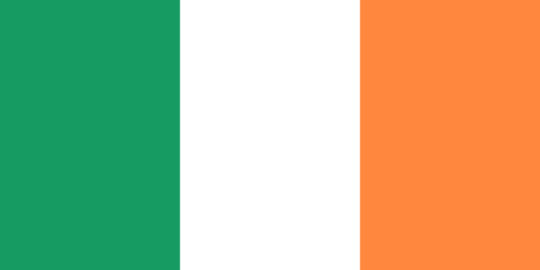
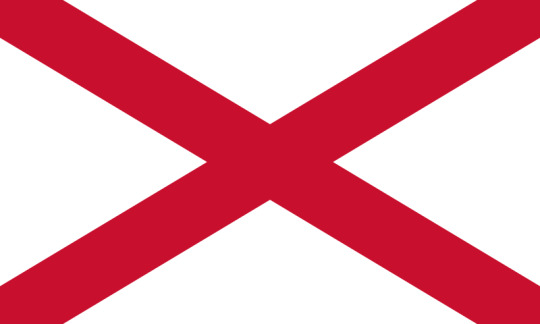
in terms of aesthetics, i am sorry to say that the union flag slaps. great colour scheme. jazzy design.
but in terms of what these flags mean... well. this is northern ireland. so they all mean something sectarian. and so i would certainly say that i like the irish flag - in that i know i'm unlikely to be attacked if i'm in an area where it's flying. that is very much not the case in areas where the union flag or the ulster banner are knocking about.
do i like that this is the case? no. and while my national sympathies are considerably more irish than british, i find our flag culture both insufferable and one of the main contributors to the continuation of the sectarian divide. it's obviously a bit kumbaya to suggest that a neutral flag might make any difference... but it couldn't hurt...
in terms of the national anthems, i never have any real cause to sing any [and the sectarian context is the same] so we're going purely on which slaps the hardest:
amhrán na bhfiann [a fucking banger!!]
ireland's call [slightly cringeworthy in its earnestness, but it does bang]
god save the king [the tune is unforgivably dull, but the lyrics genuinely go really hard - especially the discontinued ones about crushing the scottish and confounding popery.]
the londonderry air [this is what we're going with? the welsh have land of my fathers and this is what we're going with?]
22. what makes you proud about your country? what makes you ashamed?
the peace process.
because my answer to the second half of this question would be enduring sectarianism - and, specifically, enduring casual sectarianism. but i am also well aware that the flippancy younger people [especially those born after 2000] speak about the sectarian divide with is something which has only been made possible by the security of peace. it's easy for the irish women's football team to sing "up the ra" when the only thing that'll happen to them is some pearl-clutching from the press and a slap-on-the-wrist fine. thirty years ago, things would have been really quite different...
the peace is imperfect. it is fragile. it has been treated with utter disregard by the british state. the extraordinary work - especially that of the british politician mo mowlam - to bring it about has faded into an easy linear story, whose stars are tony blair and bill clinton. it has not caused complete justice to be done. it has not caused sectarian violence to vanish overnight - there are stories which emerge weekly from the city in which i live about some sort of sectarian crime.
but these stories make it into the papers because they are proportionally uncommon now. and i don't think we need to lose sight of that.
i was born in the early 1990s. i was at primary school when the good friday agreement was signed. and yet, despite the relatively few years i spent in a northern ireland at war, i can still remember roadblocks and police dogs and my dad checking under the car and bomb drills and being heckled as i walked to school and having to have your bags searched before you could enter shops and my mam crying on the day the omagh bombing happened. my siblings, born in the 80s, remember these things even more viscerally. my father, born in the 1950s, remembers having guns pointed at him by british soldiers while walking down the street, or being stopped and searched on spurious grounds by the royal ulster constabulary, or a call coming in to evacuate a place before a bomb went off.
my nieces and nephews, all born after 2000, have never experienced any of this. if they are naive about the true horrors of sectarianism... then we should reflect on how lucky that makes us.
26. does your nationality get portrayed in hollywood/american media? what do you think about the portrayal?
answered here.
10 notes
·
View notes
Text
Re: mavity rundown
There's a few things to keep in mind:
The TARDIS translation circuits don't just translate for contemporaneous languages like a dictionary look up, but translate concepts psychically, accessing the meaning of the words themselves and changing the users perception of what's been said and what they're saying. Therefore the translation circuits work for languages across time and timestreams.
The translation circuits need The Doctor to function, and they potentially can alter the functionality a tad - it doesn't translate Gallifreyian script and in the "Only Human" novel it has a swear filter.
The Doctor is less or unimpacted by changes in timestreams - they retain the knowledge of what happened before a change whereas others don't acknowledge it, at least conciously e.g. when baby Ruby was taken in "The Church on Ruby Road" (and countless previous examples).
The Doctor is fluent in 20th/21st century modern British English. This was most recently demonstrated in "Wild Blue Yonder" where he had no trouble talking to Donna without the TARDIS. But as he's learnt the language himself, he didn't know to change the vocalised translation of "gravity" to "mavity" until Donna, who's stuck being influenced by the timestream, corrected him and he rolls with it.
It's a bit up in the air how the TARDIS handles switch ups in language or its need for use. In "Fires of Pompeii" the TARDIS had Donna unknowingly speaking Latin, and when she then tried to speak Latin knowingly (Latin-squared?) it changed it to "something that sounds like Celtic" according to a street vendor, and the Doctor identifies it as/jokes that it's Welsh. In the same episode the circuits couldn't translate "volcano" as the Romans had no equivalent concept. The TARDIS doesn't translate tenth Doctor's "Allons-y", though that could be because his intention is to say something not in English and he potentially has finer control over the translation.
The Doctor is able to hear the language underneath the translation, as demo'd with the Celtic/Welsh above, which we as the audience aren't privy to.
All this to say:
1) If a time traveller from the Gravity timestream appeared and they spoke an alien language, "the concept known as Gravity" would be translated by the TARDIS to "Mavity" for Ruby. The audience would likely hear it as "Mavity" to preserve the joke (meta) and because Ruby represents the audience and we've also learnt the change, but we could argue that we should hear Gravity as that's what we'd understand best (as we are also time travellers). There's a way to argue either way, basically. But nothing would be amiss for The Doctor.
2) If said time traveller was fluent in English, but either didn't know about the "Mavity" switch or slips up:
a) As The Doctor, Ruby and the time traveller would be speaking English, its unknown if the TARDIS would catch it to translate the word. If it did, Ruby would hear it as Mavity and the Doctor as Gravity? Both? He might clock there was a translation or lack thereof at any rate. I'd assume the audience would hear it as Gravity in this situation.
b) Like we can hypothesise with "Allons-y", The Doctor could fiddle with the translator circuits as mediated through him to prevent the English-to-English translation of "Gravity", specifically to keep it as a shibboleth.
c) The safest thing to do (and to create an easy to explain build-up) would be to turn the translation circuits off if The Doctor suspects a fluent English speaker of being a time traveller, then test how they respond to a casual mention of "Gravity".
In summary, I bet Mrs Flood will not immediately understand the mavity of her slip up, giving The Doctor a small advantage.
13 notes
·
View notes
Text
https://parade.com/tv/michael-sheen-a-very-royal-scandal-prince-andrew-interview
Michael Sheen Calls Royal Family ‘Running Soap Opera’: ‘We’re Kind of Fascinated and Obsessed By It All' (Exclusive)
When it comes to the British royal family, Michael Sheen has "complicated thoughts."
"I suppose a mixture of things," the Welsh actor explains to Parade. "There was so much respect and admiration for the [late] Queen [Elizabeth] that she had devoted her life to the service of this country and did an amazing job. The royal family is an institution. When you think about the tourism it attracts and the position it plays."
To Sheen, having a "sort of figurehead" in the UK who isn't a politician also "makes a big difference." He says, "It sort of allows for a separation between certain things that maybe allows us to have a different kind of attitude towards our politicians here because a King or a Queen exists."
"So in the kind of ecosystem of our culture here, the royal family clearly plays a very important part, regardless of how you feel about issues of privilege and wealth and all that kind of stuff," Sheen adds.
The Frost/Nixon star stepped into the shoes of British royal family member Prince Andrew in Prime Video's new drama A Very Royal Scandal. The three-part series, which premieres September 19, is based on the Duke of York's infamous 2019 Newsnight interview with Emily Maitlis.
"When it was shown on TV for the first time, I think, like everybody else who watched it, particularly in the UK, we were just gobsmacked," Sheen recalls. "It was hard to understand how what we just watched, how it could have happened. You know, how did that come to be? What were the circumstances that allowed what we just witnessed to happen? And, of course, our story is exactly that. It's about looking at what are those circumstances. How could a man of such power and privilege allow himself to be put into a situation voluntarily, where he is put under such scrutiny and made to be so accountable?"
From how he transformed into the Duke of York for the series to what he thinks of King Charles, continue reading for Parade's exclusive interview with A Very Royal Scandal's Michael Sheen.
I was blown away by your transformation into the Duke of York... What went into becoming Prince Andrew for this series?
Playing a member of the royal family is a challenge because, on the one hand, there's a lot out there about them, obviously. But it's usually very controlled and stage-managed. When there's public interactions, [it's] in a very controlled and organized way. And then, of course, there's a lot of gossip about what happens behind the scenes and that kind of stuff. The royal family is our longest-running soap opera in this country, so we're kind of fascinated and obsessed by it all. But it's quite hard to sift through the facts from the fiction, and that's just generally speaking with the royal family. When it comes to Prince Andrew, it's a bit like a hall of mirrors, particularly around the episodes, the issues that we're dealing with in this. At the heart of this story and at the heart of the character, for me, was a mystery. I don't know what he did or didn't do beyond a certain point. We know up to a certain point. We know about his relationship with this person and that person. He went to this place and this kind of stuff. But then beyond that, we don't know.
And so, as an actor, I have to make choices. I need to know what my character did or didn't do in order to play the scenes. So I had to make choices. They were not necessarily reflective of what actually happened in real life. I don't know, but I had to make choices. I'm not going to say what those choices were because I don't want to affect how people watch it. That was a challenging aspect of it compared to other characters I've played based on real-life people. There wasn't that same element, kind of mystery and the unknowable there.
But I watched the interview itself, I mean, hundreds upon hundreds of times. And to begin with, of course, in order to get familiar with the interview, knowing that we're going to portray it. But as time went on, it started to kind of reveal things. The real minute details of it that you wouldn't necessarily notice watching it on TV for the first time, or even for the first few times. But when you've watched it hundreds of times and listened to it, you start to pick certain things up that were kind of hidden to you before, that became real clues to me to areas of him as a character that I could explore in the rest of the piece, not just in the interview. So that was really the heart of it, was that interview.
At what point when you first watched the interview were you like, "Oh, this is going south quickly?"
I mean, I think the same as everybody else! When it was shown on TV for the first time, I think, like everybody else who watched it, particularly in the UK, we were just gobsmacked. It was hard to understand what we just watched, how it could have happened. How did that come to be? What were the circumstances that allowed what we just witnessed to happen? And, of course, our story is exactly that. It's about looking at what are those circumstances. How could a man of such power and privilege allow himself to be put into a situation voluntarily, where he is put under such scrutiny and made to be so accountable?
People just don't do that. People in those positions just throw money at something for it to go away and not deal with it, and never put themselves in that kind of vulnerable position. So, for me, the questions I had to ask were, what does it take for a man to think that's going to go well? And what does it take for a man to get to the end of it and think it did go well? And everybody else who [was] watching sees a car crash, sees an extraordinary thing. So that was very revealing in that he allowed himself to be in that position in the first place and felt that it had gone well afterward. That tells a whole story, or at least makes you start to ask questions about that person and their life and their circumstances that would allow for that.
Did playing Andrew affect or change your perception of him in any way?
Oh, it definitely did. Yes. It did. It had not really struck me before in the same way about the fact that, clearly, a big high point in his life was the Falklands War. It had a huge impact on him. I assumed that a royal would be put in this kind of safe place in a war. But he was right in the thick of it. He was in the action. He put himself in real danger. And so then to see him come back from the Falklands War, when he was a young man in uniform, having performed acts of courage, adored by women in the UK, and sort of worshiped almost, the tabloid frenzy around him, about his relationships and all that kind of stuff.
And then to see what has happened since then. Through a natural process, [he's] aged. He sort of lost those looks. He's got further and further away from the center of interest of the royal family as the "spare" as he's known, the brother who's not going to be king. The brother who is going to be king has more children, so he gets moved down the line. And I found that really interesting. That had never really struck me before. That for someone, from the outside, who seems to have so much, to have everything you could want, to get an understanding that from his point of view, he seems to be denied so much. He seems to have lost so much. And to be on the outside of things so much, that definitely changed my perception.
Have you heard anything from Andrew's circle, or from people with close ties to the royal family about your portrayal of [the Duke of York]?
Well, obviously, it hasn't gone out yet. I haven't heard [anything]. I very much doubt whether I will. It's a very closed world that I would be very surprised if I did hear anything. It's always a strange thing to play a character based on a real person. You inevitably feel a responsibility towards that person. Even though I'm trying to portray something that is very much warts and all and very rounded and has complexity and all of that, you still can't help but feel a responsibility in the fact that you're portraying a real person who's gonna have real feelings about it, and their family and all the rest of it. The job I've done on it, it's not going to please everyone. People will come at it with such preconceived ideas and opinions about a person. So, I don't know. But I just hope that people recognize it as a real human being.
You met the late Queen [Elizabeth] and received an OBE from her in 2009. When it was reported in 2020 that you had returned it, you spoke about getting to a time when there would be a sort of changing of the guard in the royal family. [This September marks] two years since the Queen's passing. I'm curious: What are your thoughts on the royal family today?
Well, I think, as we do as a nation here, have sort of complicated thoughts about it, really. I suppose a mixture of things. There was so much respect and admiration for the Queen, that she had devoted her life to the service of this country and did an amazing job. The royal family is an institution. When you think about the tourism it attracts and the position it plays. I think the fact that we have a sort of figurehead in our country that isn't a politician makes a big difference. It sort of allows for a separation between certain things that maybe allows us to have a different kind of attitude towards our politicians here, because a King or a Queen exists.
So in the kind of ecosystem of our culture here, the royal family clearly plays a very important part, regardless of how you feel about issues of privilege and wealth and all that kind of stuff. I think it was always going to be a challenge for someone to take over the mantle of the late Queen. But [King] Charles seems to be doing a very good job of that, and seems to be providing consistency in challenging times. He was always a man who, in the past, was quite free with his opinions. And I think people were worried about how that would work and whether that would have to change. But it seems like he's doing a very good job of that at the moment.
Is there one member you haven't met who you'd be keen to meet in the future?
I would love to meet Princess Anne. She seems like such an amazing person, and funny and smart. She seems to handle that position very, very well. She seems to be one of the most charismatic of all the royals to me. So I would love to meet her.
6 notes
·
View notes
Note
how is welsh not an ethnicity? /gen bc at this point i genuinely don't think i know what an ethnicity is! on forms it tends to be skin colour, but when i google it there's always an emphasis on culture.
This one is a bit of a sticky topic since it is a situation where the same words can mean slightly different things to different people and conflation between similar words is common.
I'm going to use a crochet metaphor for this since it is a non-problematic version of the same problem. So, in crochet, there are various different kinds of stitches, the most common being single and double crochet. However, in the US and the UK, there are terminology differences which can get confusing since they refer to similar (yet distinct) stitches. What is called 'Single Crochet' in the US is called 'Double Crochet' in the UK. And what the US calls 'Double Crochet' is called 'Treble Crochet' in the UK. This kind of thing happens all the time in various situations - be it a hobby, a topic or a concept, linguistic differences can arise in two or more groups which leads to all groups involved using the same terminology, but it meaning wildly different things to different people.
This is the situation when it comes to defining race and ethnicity. Like crochet, in the English-speaking world, the US uses the terms race and ethnicity differently to how the UK does it. Ditto for other Anglophone nations like Australia, New Zealand etc. But for simplicity I will just focus on the US and UK for now. [Note: there will be many caveats and nuanced things which will require a pinch of salt in my answer here, so do keep in mind I'm simplifying a lot here to avoid this post from getting too long]. This is also where I introduce a third term to the mix: Nationality. Nationality is our 'Treble Crochet' in this metaphor.
Ethnicity:
As you point out, on forms ethnicity sometimes is used to refer to skin colour, but in other circumstances there's more of an emphasis on culture. This is where the different people using the same terms for different things starts to cause problems. Using the forms example as a jumping off point, when you fill in a form and get to the section titled ethnicity, the options can often be quite confusing since some of them appear to refer to race, while others do not. In 2021 England and Wales had a census and the government made a list of ethnicities here from the results:
"The main changes to the 2021 Census of England and Wales, compared with the previous Census, were:
-the ‘Roma’ group was added under the ‘White’ ethnic group
-a write-in response was added for the ‘Black African’ ethnic group"
This, as you can probably see, already has Some Issues. For example, Roma are a distinct ethnic group, but have here been put under the category of white (which is a more racial classification), when many Roma would not identify this way. Some would identify this way- but the problem lies within the creation of rigid boxes with no room for overlap. Ethnicity as a concept overlaps with nationality a fair bit, since there is no agreed upon definition for either term. Things get complicated when some people approach ethnicity with solely race in mind, while others approach ethnicity with solely nationality in mind. Ethnicity can be informed by race and nationality- however - that can get sticky fast depending on context. Just focusing on Wales, however, I would argue Welshness is only informed by nationality and culture, not race. To argue there is a racial component to being Welsh would mean arguing that Welsh people have significant racial identifiers which distinguish them from the neighbouring Scottish and English- as well as the rest of Europe in general. And this, inevitably is how fascism happens. It also raises red flags to go down this road simply because by default, these arguments disqualify nonwhite people from being Welsh at all and we all know what happens when certain white traits are idolised over others...
On the other hand, considering ethnicity from a purely nationality and culture-based approach is much more suitable for Wales as it encapsulates what comes to mind when one thinks of Wales and Welshness. Welsh national dishes and traditional dress are not tied to race in any way. Race simply has not been significant to the formation of Welshness amongst its neighbours (England- more distantly Scotland and Ireland). Whereas race *is* significant to the conception of ethnicity of other nations in the world, such as Aboriginal Australians, whose modern conception of ethnicity is tied to their race in contrast with the arrival of white Australians. In other words, Aboriginal Australians are a racialised people while Welsh people are not. Ergo, it is a highly individual thing as to whether certain nations find race important to their ethnic identity or not.
Official forms may list "White, Welsh" as an option for ethnicity, however, this does not imply that white Welsh people are a separate race to "White, English", "White, Scottish" or "White, Northern Irish" or vice versa, it is more of an appeasement by the government in the census to allow people from Wales, Scotland and Northern Ireland to be able to identify as Welsh, Scottish or Northern Irish where they ordinarily would have to begrudgingly select "British". That being said, the government should add "Black, Welsh" etc. options as well, but their absence here is governmental laziness than anything else (they have a box on the census to 'write-in' any ethnicity option not available on the list) so that avoids them from having to formally add in these as options. The bottom line is- it is not possible to be 'racially ethnically Welsh' but it is possible to be 'culturally ethnically Welsh'. Despite this, the latter designation is shied away from simply because 'ethnically Welsh/English/Scottish/Northern Irish' in any context is a dogwhistle used by white supremacists. Most people tend to identify as Welsh/English/Scottish/Northern Irish without any racial component to that identity for this reason.
Nationality:
Nationality is a little easier to define (but cannot be pinned down 100% for a few reasons) but the simplest definition of nationality relates to the country you were born in or are a citizen of. Nationality is not fixed and can change. However, the problems with defining nationality this way is that there are many nations which are not recognised as such internationally. Take Wales for an example- Wales is a country or a nation but it is part of the United Kingdom, which is a State. Here too is where a US/UK divide springs up, since in the US state can refer to the individual States which make up the US. While elsewhere State generally refers to a country or nation with international recognition on the world stage. The US is a State, so is the UK in this metric.
[Important to note that the US is not the only country to have states within it- the system of states within a country is called Federalism and many countries have this system. E.g. Australia has many states, but none of those states are separate countries. Neither are US states (i.e. Oregon is not a separate entity to the US on an international level- it does not send diplomats to the rest of the US or other countries, for example. Ergo it is a constituent part of the US, not separate to it. Ditto the other 48 states on Mainland America. Hawaii is *different*). Part of the confusion stems from the tendency for Americans to view their states as if they were separate countries within a regional organisation, however, this is a misunderstanding of Federalism. Many Americans point to the EU and assume the EU is a country with lots of little European 'states' (small 's') within it. This is false- the EU is essentially just a club the European countries are part of. It's like saying NATO is a country- if you understand how that wouldn't make sense, that's also how calling the EU a country doesn't make sense. Members of the EU like Germany also have Federalism- e.g. Germany has 16 states.]
Back to the point- Wales is a nation which exists within the UK alongside England, Scotland and Northern Ireland. It is possible to get a passport as a citizen of the United Kingdom, but impossible to get a Welsh, English, Scottish or Northern Irish passport. The same way you can get a US passport but not a Maine passport etc. The stickiness lies within the fact that Wales is indisputably a nation, but legally it is not possible to be a citizen of Wales. All people who live or are born in Wales are citizens of the United Kingdom by default. Therefore, defining nationality strictly on where you're born or where you move to live is exclusionary of many nations that aren't Nations (capital 'N'). See also: the Native American Nations that exist within the US who also don't have international recognition as separate nations which can issue (legally recognised) passports. The goal of Welsh nationalism is to establish Wales as an independent country to the United Kingdom, similar to the Scottish independence movement for Scotland. Hence why someone's Nationality can be Welsh without Wales legally being a separate country.
Race:
I have touched on why race isn't relevant to Welshness already a little bit, but I will add a little more here too.
There is a tendency from many people in the US (specifying US as there seems to be a real culture for it there) to identify with a country they have an ancestor from. There isn't anything wrong with celebrating your own heritage. However, this is where the US and rest of the world tend to define things differently. It is not uncommon to find any European lamenting (some) Americans who identify as the country that European is from based purely on having one ancestor from that country hundreds of years ago. This is down to the US conception of race and the racial climate specific to the US (and only the US). E.g, you may get many people in the US who are proud Irish-Americans and go around claiming Irishness because of having 'Irish blood'* from their great-great-great-great grandmother on their father's side (*another dogwhistle which many who do this are not aware of). This, and it cannot be stressed enough, does NOT go down well in Europe. 'X country's blood' harks back to the conception of ethnicity which includes racial aspects- which as I've explained, is a white supremacist dogwhistle. It also very clearly has parallels with 'blood quantum'.
The other complication is that 'Irish-American' to a European would generally be understood to mean someone with dual nationality in Ireland and the US. This terminology is overwhelmingly US based and as such, US concepts of race butt heads with how it is defined in other parts of the world. E.g. in the US it has been common to refer to black Americans as African-American (regardless of how inaccurate that can be) to the point where the term black and African-American are synonymous. This leads to the black British actor Idris Elba being called African-American, when that makes no sense outside of a US context. Furthermore, UK and US terminology differs in other ways. The US uses the acronym POC to refer to People of Colour, while in the UK BAME is sometimes used for Black, Asian, Minority Ethnicities [caveat both have their own issues which we will not get into here].
Bringing this back to Welshness, there is no racial component to being Welsh, ergo race is not a factor in someone's Welshness.
Summary:
Ethnicity is something that may be informed by both race, culture and nationality, just race, just culture or just nationality. Whichever of those a given people has is informed by the historical evolution of the people and its relationship with other peoples. Certain combinations of the above are more suitable for certain peoples than others.
Nationality is something which is usually formally bestowed upon an individual based on either where they were born or if they move and naturalise as a citizen of somewhere different to where they were born. It can also be something which is informally adopted by a person living in or identifying with a nation not currently recognised as independent by the international community, but is nonetheless extant and may even be campaigning for Statehood. Lack of international recognition is not a barrier to national identity.
Race is something which is also bestowed at birth and consists of a set of traits or features associated with different racial groups, such as skin colour.
I hope that this has been useful and informative. Since you're on anon I don't know where you are from exactly, but I hope this at least leaves you feeling less confused. As with all things, there are many asterisks and pinches of salt, so do not take this for gospel. Rather think for yourself and do some research around some of the topics I've mentioned here to get more informed on the topic.
#welsh#cymreig#ethnicity#nationality#race#white supremacist mention#Wales#Welshness#Cymreictod#ask to tag#ask#gofyn#long post
44 notes
·
View notes
Note
So it's just occurred - if you and Steff are in line for the Welsh throne, and so is Cacen then Tumblr is a social media site that is HARBORING THE WELSH ROYAL FAMILY. We're all out here shit posting and literal royalty??? Is here??? You even have a treason tag???
Well I mean. I hasten to explain that I have the treason tag because I'm anti-monarchist, not because I'm vying for, you know, A Throne Of My Own, but sure, yes.
... also I suppose we all have Facebook accounts. I mean I don't use mine, but technically there's more family members on there, so there's more Welsh royal family on that site (if that's how we're viewing the utter chaos that is this family)
But yes, you are in the presence of Lost Chosen One Royalty, you damnable peasant. How dare you speak to me (am I doing this right)
154 notes
·
View notes
Text
I don't collect many things, but of the things I do collect I think the most surreal is physical Mabinogi merch.
To explain Mabinogi is an MMORPG that came out in 2008 and I've been playing it ever since beta. I'd argue it has plenty of charm and enough reason even now in 2023 for anyone with even some slight interest in it to give it a shot however to me (and to my partner) it has a special place. Not only is it how my partner and I met, but it's literally a game I have played for 15 years now; considering I'm 28 that's over half my entire life.
As you might imagine back in middle school and even early high school I didn't really have a lot of money, let alone the understanding of how to order things from overseas. So a very niche MMORPG didn't necessarily have a lot of merch out and about. While most kids at my school had Pokémon backpacks or some kind of Anime plastered on their shirt (normally Naruto or Dragonball) I never had physical merch. So I was always that annoying kid who had to verbally tell you how much I liked my dumb special interest.
To give you an idea of how much this game was a part of my life, my mother once bought me an actual copy of the Mabinogion, like; the book that the game is loosely based on, it's entirely in Welsh and my mom also gave me a dictionary to translate it, I was stoked about this; I was in early high school walking around with a black book with a red symbol on the front speaking in Welsh as you can imagine this did not make me popular and cool.
Now my partner and I collect actual official merch, just last year we acquired a few magazines, guide books, and even manga. It's incredible to behold such a snapshot of time from when this was all still new and popular.
This is a guide book from back when the slogan for the game was still "fantasy life" it would later become "anime life" and a few other things; but this is the one I remember from my childhood:

We were really excited to look through this and translate it, more over we were taken aback by the system requirements listed in the guide book, I mean just check out these specs!

The funniest part is that there was a time at which I was getting a new laptop because I had to travel and I specifically gave the guy at Bestbuy this almost exact rundown for the specs I needed. This was of course because my plan was to install Mabi on it, which I did. However I had a hard time explaining to anyone why I wanted these sort of specs specifically without saying "uh so I can play an extremely niche online game from Korea?"
We also got books that were literally Item and databooks which had full lists of items you could obtain in the game as well as what races and genders could use them:

This was an absolute trip down nostalgia lane for us.

I cannot stress just how cool it was to flip through these pages and go "oh shit I had those, oh I remember that! Remember this? Yea it was from an event, damn that was a long time ago; oh god I'm old."
It's crazy to see just how much detail and effort went into these! I didn't even know they existed, if I was aware of these back in school I'd have gone ballistic over them like, check this out there's entire pages dedicated to Generation 1:
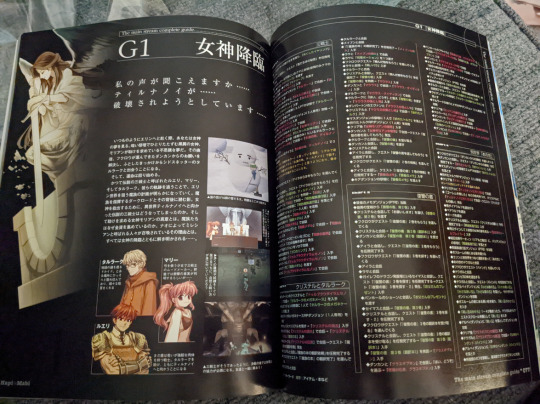
of course the merch pages caught our eye looking over all the stuff we have yet to hunt down for our collection
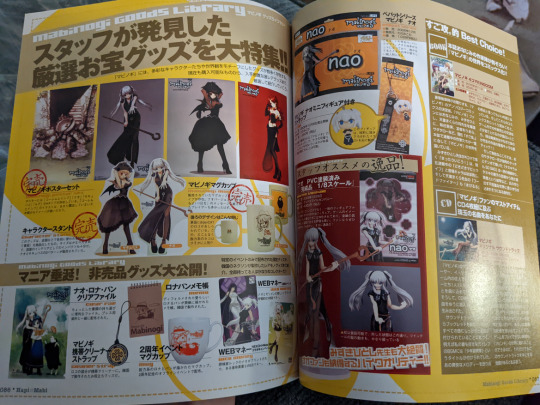
These books are great and I personally love the manga, illustrations of the world that I've only ever seen as low poly PMGs is such a sight to behold as a long time fan.
However you may notice something, there's not a ton of physical merch. Sure there's books and manga, and it seems like at one point there were standees and a few figures, posters, and mugs; but these days getting your hands on the rarer merch can be difficult and not to mention expensive.
That's sort of why we excitedly took matters into our own hands, slowly and methodically recreating the game's PMG models as OBJs we can actually print from our 3D printer. It's not easy but it's totally worth it.
I know this probably sounds REALLY stupid to you, and I wouldn't blame you for laughing at me for it; but the fact that I have played this game for 15 years; and today I held a 3D printed figure of a Golem in my fucking hands has me feeling a certain kind of way that's hard to explain. Knowing I could print figures of our characters, our favorite NPCs, not to mention entire dungeons and create dioramas of our favorite places from a game that means so much to me is genuinely mind boggling.
I think the part of all this that still has me in disbelief is that if you asked me what I wanted when I was a depressed 16 year old in school who came home and immediately jumped on Mabi; I'd 100% tell you that I just want to live alone with a partner who enjoyed Mabi and maybe a few cats. Now I'm 28 living with a partner who I not only met via this game but who is actually significantly better than me at it lol; we also have 3 cats and our home is slowly but surely being decorated with more and more Mabinogi crafts. I don't mean to sound like my life revolves around this game, though I admit I do laugh when my partner breaks out her signature slogan of "Mabinogi is Real Life" but I guess in a sense it just feels like I've fucking made it you know? I did it, I finally got the life I was longing for and while it may not feel real; every day this sort of thing happens makes it a littler harder to deny that I'm living the dream. I'm far from rich and I'm far from healthy; and I don't exactly have a great career or anything sure, but I think 16 year old me would be happy with the way I turned out.
12 notes
·
View notes